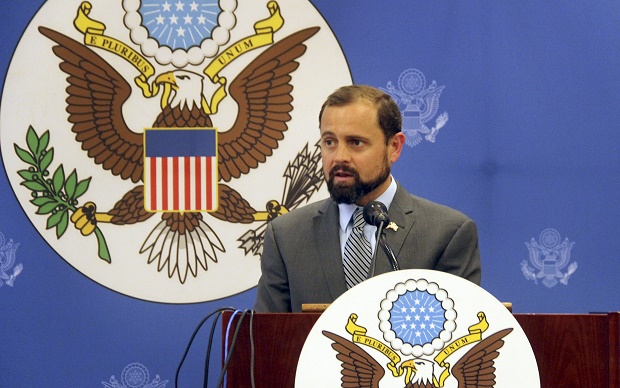Burundi risks genocide, US envoy warns

U.S. Special Envoy for the Great Lakes Region Tom Perriello speaks at a press conference in Bujumbura, Burundi, Tuesday, Nov. 10, 2015. Perriello told reporters in the Burundian capital that he is urging Burundi’s government and the opposition to start internationally mediated talks without pre-conditions in order to end the country’s political crisis. AP Photo
WASHINGTON, United States—Burundi is at risk of genocide, warns Thomas Perriello, US Special Envoy for the Great Lakes Region of Africa, days after President Barack Obama slapped sanctions on the public security minister and three others.
READ: UN condemns Burundi killings, threatens possible sanctions
Burundi descended into violence in April after President Pierre Nkurunziza launched a bid for a third consecutive term in office, despite concerns over the legality of such a move.
At least 240 people have been killed and more than 200,000 have fled the country since the opposition took to the streets to protest the incumbent’s refusal to give up power.
READ: UN to vote Friday on resolution condemning Burundi killings
Article continues after this advertisementQ: Is the US going to take additional sanctions further sanctions?
Article continues after this advertisementPerriello: This is certainly an ongoing process. We continue to investigate individuals who play a particularly significant role in destabilizing Burundi or contributing to escalation of violence or repression and we wanted to be very clear that there are consequences both on the government side as well as those who (attempted) to stage a coup in May and we will continue to look at this and I know the European Union, which led with sanctions, will also be looking into it.
The sanctions are the latest in a series of steps by the United States, the European Union, the African Union and the United Nations to ensure consequences for… repressive acts. So you see significant cutting of various forms of non-humanitarian aid over the last year, certainly the last few months, as well as the targeted individualized sanctions.
So we want to get the peace process started so the people of Burundi have the chance for peace and for an open democratic society that they so clearly desire and there will consequences for those who push in a different direction.
Q: Is Nkurunziza’s bid for a third term the only cause of the crisis or is it deeper than that?
Perriello: It is certainly deeper than that. We see a general trend for a more repressive state and use of violence. Certainly the African Union called out the decision by the president to go forward with non-inclusive elections, as the primary driver of this crisis. We’ve also condemned those who attempted a coup, which is not the right way to address the problems that have been raised.
Again that goes much beyond the third-term issue, although certainly this is a major cause of the crisis. But we are talking about a broader closing of the political stage, something that we see happening unfortunately next door in Democratic Republic of Congo.
Q: Is there a risk of genocide?
Perriello: It is certainly a risk but it is not yet present reality. We have seen very dangerous signals from senior government officials about what makes this conflict more ethnic in nature. But its also for the government and others to note that genocide is not the only serious international crime. There is torture or extrajudicial killing that is still a serious crime. So we certainly continue to track ethnic language but also look at additional crimes.
We certainly all want to remember the terrible tragedy that happened in Rwanda, but also the terrible tragedy that happened in Burundi itself: a brutal civil war over multiple generations. We want to make sure that we are looking at the dynamic of the region but also at the specific history of Burundi and that is something that we tried to do ahead of this crisis.